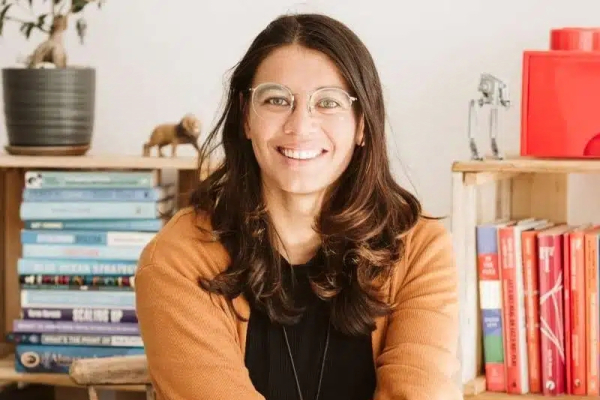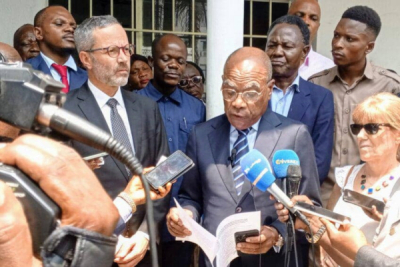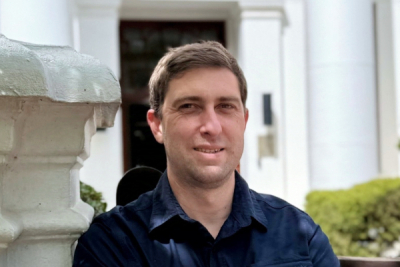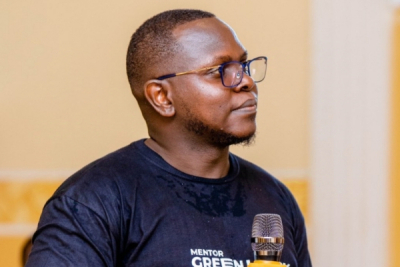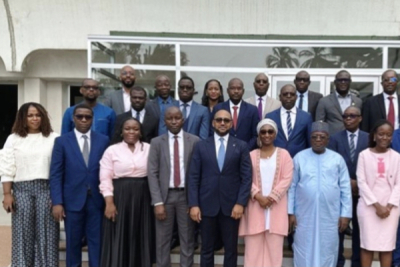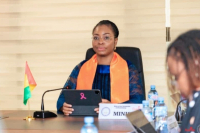She creates engaging educational programs and creative projects that inspire children to become independent learners.
Gabi Immelman (photo) is a South African entrepreneur, learning designer, and educator. She is the co-founder and CEO of Mindjoy, a startup offering innovative learning solutions for students.
Founded in 2021, Mindjoy empowers students to take control of their own education while safeguarding their data privacy. The company leverages artificial intelligence (AI) to support learners in STEM fields (science, technology, engineering, and mathematics), enabling them to explore and solve problems at their own pace. This approach frees teachers to focus on areas where their guidance is most impactful.
Mindjoy provides students with access to a multimodal AI tutor capable of seamlessly integrating images, videos, and enriched text into lessons. This interactive system offers immediate and personalized feedback, accelerating the learning process and enhancing student engagement.
Before founding Mindjoy, Gabi Immelman launched Pukka School in 2016, an initiative focused on fostering children’s creativity. The program encouraged exploration, curiosity, and learning through play, giving children the freedom to develop their inventiveness.
Immelman holds a bachelor’s degree in dramatic arts, theater, and directing from Stellenbosch University, earned in 2012. In 2021, she completed a master’s degree in inclusive education innovation at the University of Cape Town.
Her professional journey began in 2013 as a production manager at Saartjie Botha, a South African entertainment company. In 2014, she became a director, teaching artist, and technician at the Palo Alto Children’s Theatre in the United States. The following year, she joined Modern Times Stage Company, an American theater company, as an assistant producer. In 2018, she was appointed head of learning and development at Maara House, a learning-focused school in South Africa.
By Melchior Koba,
Editing by Sèna D. B. de Sodji
Eyone, a Senegalese company specializing in digital healthcare, has raised $1 million to strengthen its position in the sector and expand across Africa.
The funding, announced on December 6, includes $855,000 from the Sonatel Group through its VIF (Véhicule d’Investissement et de Financement) fund and $145,000 from Banque Internationale pour le Commerce et l’Industrie du Sénégal (BICIS).
This funding will support Eyone’s plans to expand to other African countries, develop AI-powered medical solutions, and include more specialized healthcare professionals.
Digitizing cultural institutions has emerged as a critical priority for many nations seeking to preserve their heritage and enhance public access to knowledge. International collaboration is essential to support these modernization efforts.
The Democratic Republic of Congo (DRC) has requested France’s assistance to modernize and digitize its National Library. The project was presented by MP Léonard She Okitundu during a visit by French Ambassador to the DRC, Remy Maréchaux, to this library on Monday, December 9.
"Equipping the Democratic Republic of Congo, the largest Francophone country, with a modern National Library is crucial for promoting and preserving the French language within the framework of global linguistic diversity," said Léonard She Okitundu. He also emphasized the urgency of digitizing the institution to meet current demands, noting that French President Emmanuel Macron has previously shown openness to supporting this initiative.
This appeal aligns with the DRC’s ongoing digital transformation efforts under its National Digital Plan "Horizon 2025." The National Library, established in 1989 and a cornerstone of the country’s heritage, faces significant challenges due to its deteriorating state. Housing over 120,000 books and 700,000 historical black-and-white photographs, the library urgently requires digitization to prevent irreversible damage or loss from potential disasters like fire, which could jeopardize decades of conservation and cultural enrichment efforts.
Should discussions about funding, raised by Remy Maréchaux, come to fruition, digitizing the National Library would bring several notable benefits. It would safeguard historical documents against the ravages of time and improve accessibility by making them available on digital platforms, thereby reaching a wider and more diverse audience. Furthermore, this digitization would enhance the dissemination of Congolese knowledge and culture on a global scale.
By Samira Njoya
Editing by Sèna D. B. de Sodji
He leverages blockchain technology to launch innovative products in the market. After contributing to the growth of several fintech companies, he founded his own startup specializing in financial technologies.
Carel van Wyk (photo) is a South African engineer and tech entrepreneur. He is the founder and CEO of MoneyBadger, a company specializing in financial technology.
Founded in 2021, MoneyBadger offers a platform that simplifies bitcoin payments, both online and at physical points of sale. The company’s ambition is to create a world where networks for information and value transfer transcend borders, leveraging a currency suited for the digital age.
MoneyBadger provides CryptoQR, a universal translation app that facilitates interaction with traditional point-of-sale systems while accepting cryptocurrency payments. The startup enables businesses and e-commerce merchants to easily integrate its solution into their software or shopping carts to accept cryptocurrency payments.
Before founding MoneyBadger, Carel van Wyk co-founded Luno in 2013, a company specializing in cryptocurrencies. Luno’s solutions allow individuals and businesses to securely store, buy, use, and understand cryptocurrencies like Bitcoin with ease and safety.
Carel van Wyk graduated from Stellenbosch University with a bachelor’s degree in electronics in 2008, followed by a master’s degree in augmented reality in 2010.
After his studies, he joined Bazooka Games, a video game publishing company, as Director of Software Development. Between 2012 and 2013, he worked as a software engineer at SnapScan, a fintech firm, and FireID, an organization that helps passionate and talented entrepreneurs create companies to solve major challenges. From 2019 to 2023, he worked as a software developer at KnowBe4, a tech company specializing in security awareness training and phishing simulation programs.
By Melchior Koba,
Editing by Sèna D. B. de Sodji
A serial entrepreneur with 14 years of experience in creating innovative startups across various industries, he has also worked with multiple incubators, supporting young entrepreneurs in launching and growing their ventures.
Simon Balemba Effansa(photo) is a Cameroonian computer scientist and tech entrepreneur. He is the founder and CEO of Fluide Finance, a digital bank dedicated to small and medium-sized enterprises (SMEs).
Founded in July 2024, Fluide Finance offers innovative solutions to simplify financial operations, enhance productivity, and drive business growth. The bank’s mission is to democratize access to efficient financial services by providing a comprehensive range of tools designed to help SMEs succeed.
Fluide Finance’s all-in-one platform centralizes several services: banking solutions for SMEs, business management tools (accounting, invoicing, customer relationship management), back-office support, and digital transformation consulting. This approach allows businesses to operate securely while optimizing their efficiency.
Simon Balemba Effansa is also a startup mentor at ActivSpaces, a tech incubator based in Cameroon. Before launching Fluide Finance, he co-founded Akwajobs in 2015, an online job platform where he served as CEO. In 2017, he created Healthy Lifestyle Foundation (HELIF), a multi-specialty healthcare organization he promoted. He graduated from the University of Buea with a bachelor’s degree in computer engineering and systems in 2013 and a master’s degree in operations, finance, and project management in 2018.
Between 2017 and 2018, he worked as a business development consultant at Makonjo Media, a marketing technology agency. In 2020, he joined Jongo Hub as a center manager.
From 2022 to 2024, he served as CEO of Bohikor, a fintech startup. Simultaneously, he worked as a business development consultant at Mountain Credit Union (MoCU), a digital credit cooperative, and as an enterprise architect at Iknite Space, a talent accelerator.
By Melchior Koba,
Editing by Sèna D. B. de Sodji
While many African countries express growing interest in e-government initiatives, securing domestic funding for these projects presents significant challenges. Diversifying funding sources at the continental level could offer a viable solution.
The West African Development Bank (BOAD) and the German development bank KfW recently launched the Digital Transformation Fund (DTF), designed to serve the West African Economic and Monetary Union (WAEMU) region.
The launch, in Lome, follows years of development, with the project initiated in 2020. Envisioned as both a financial and strategic tool, the DTF aims to support digitalization projects across the eight WAEMU member states.
The fund is dedicated to transforming public administrations through the modernization of technological infrastructure, the development of information systems, and the implementation of innovative digital solutions. Its flexible and scalable resources will be tailored to the specific priorities of each participating country.
"The DTF embodies our collective ambition to build modern administrations capable of effectively meeting the needs of our populations in an ever-changing world," said BOAD Vice President, Moustapha Ben Barka, when presenting the initiative at the launch event.
In Togo, the fund arrives as the country strives to enhance its digitalization efforts and modernize public services. In recent years, the Ministry of Digital Transformation, supported by the operational efforts of the Togo Digital Agency, has implemented significant reforms, including the digitization of numerous administrative services. The country aims to digitalize 75% of public services by 2025.
Ayi Renaud Dossavi
Demand for high-speed internet is surging as individuals and businesses increasingly rely on digital technologies. As service quality becomes paramount for addressing a range of challenges, upgrading telecommunications infrastructure has emerged as a critical strategic priority.
The Guinean government has completed an expansion of the national fiber optic backbone capacity from 50 to 200 gigabytes, the Ministry of Posts, Telecommunications, and the Digital Economy said on Monday.
The upgrade aims to improve internet service quality for Guineans. The backbone, the fiber optic network that transmits internet traffic across the country, can now handle significantly more data, potentially leading to faster connections and fewer slowdowns for users, especially during peak hours. This expanded capacity is also expected to support the delivery of high-speed internet services to underserved rural areas.
The work follows frequent consumer complaints about the quality of services provided by telecom operators, particularly voiced on social media. In September, Posts, Telecommunications, and the Digital Economy Minister Rose Pola Pricemou (photo) demanded urgent action from stakeholders to address "the concerning deterioration of network quality and internet speeds impacting the Guinean population" since the beginning of the year.
Improved service quality from this backbone upgrade could enhance the digital experience and unlock new opportunities for individuals and the broader community, according to the GSMA (Global System for Mobile Communications Association). However, efforts to broaden internet access across the population must continue.
As of June 30, 2024, the Guinean Postal and Telecommunications Regulatory Authority (ARPT) reported 6.6 million mobile internet subscribers, representing a penetration rate of 47.42%.
By Isaac K. Kassouwi,
Editing by Sèna D. B. de Sodji
Many African economies have historically relied on natural resource exports. However, industries like IT and customer experience offer an opportunity to diversify revenue streams and build resilience against commodity price fluctuations.
Provider of Customer Experience (CX) solutions and contact center services Foundever has signed a Memorandum of Understanding (MoU) with the Information Technology Industry Development Agency (ITIDA). The agreement, announced on December 7, aims to expand Foundever’s operations in Egypt and outlines a €65 million investment over the next four years, creating 5,000 new jobs in Egypt.
ITIDA CEO Ahmed Elzaher expressed pride in Foundever’s expansion, aligning with Egypt’s Digital Egypt Strategy for the Offshoring Industry. The expansion also reinforces Egypt’s position as a hub for business process outsourcing, particularly in Cairo and Upper Egypt, he remarked.
The MoU was signed by Elzaher and Mina Wahba, Foundever’s General Manager in Egypt, with key officials from ITIDA and Foundever present. Discussions also explored ways to enhance freelancer capabilities and support women’s economic empowerment in Egypt.
Foundever plans to expand its centers in Nasr City and Maadi Technology Park and open a new center in Luxor, demonstrating its commitment to the Egyptian market. The MoU aims to strengthen the country’s offshoring industry, focusing on customer support, technical assistance, and sales services.
Minister Talaat praised Foundever’s decision to open a Luxor center, reflecting growing confidence in Egypt’s skilled workforce and the country’s ability to deliver multilingual services. He highlighted the government's efforts to enhance Egypt’s digital infrastructure, foster investment, and provide workforce training to support the offshoring sector.
The unemployment rate in Egypt has been a challenge, particularly for youth. According to the Central Agency for Public Mobilization and Statistics (CAPMAS), Egypt’s Unemployment Rate increased to 6.70% in Sep 2024, from the previously reported figure of 6.50% in June 2024. The Foundever expansion directly addresses this issue, offering young people career opportunities, particularly in a high-demand sector like customer service, which requires strong multilingual and digital skills. The agreement aligns with Egypt’s broader economic strategy to boost the Information Technology Outsourcing (ITO) and Business Process Outsourcing (BPO) industries.
Hikmatu Bilali
To help children and teenagers better understand various school concepts, a tech entrepreneur has launched an online learning platform that is revolutionizing education through innovative content.
Sikul, an online learning platform developed by a Gabonese startup, offers educational and entertaining content for children and teenagers. Founded by Lynda Hernandez Moibouey in September 2020, Sikul aims to make learning engaging and accessible.
Currently, Sikul is accessed through a web browser. Users create accounts with personal information to explore the platform's offerings, which include videos and digital books often developed in collaboration with educators.
The platform covers a range of subjects, including grammar, mathematics, conjugation, spelling, vocabulary, English, and local languages. "We teach children while entertaining them, helping them develop essential skills to become well-rounded adults," said Moibouey. "Our offerings include video DVDs like 'Ma maternelle en poche' (volume 1), 'Mon premier syllabaire' (volumes 1 and 2), 'L'écriture des mots,' 'Je sais conjuguer,' and a special word search DVD."
Regarding digital books, Moibouey highlighted titles such as "Mon super alphabet illustré," "L'abécédaire des animaux," "L'abécédaire des fruits et des légumes," and "Animal Alphabet."
Sikul currently boasts 161 active accounts, 77 videos, and 30 educational games. Access requires a subscription, starting at 7,000 CFA francs (approximately $11.20) per month for one parent and one child. A three-month subscription for one parent and two children costs 15,000 CFA francs, while an annual subscription for two parents and five children is 48,000 CFA francs
Adoni Conrad Quenum
To simplify financial and commercial transactions for the Gambian population, a tech entrepreneur has taken the initiative to digitize several financial services by developing a tailor-made solution.
Waychit is a digital solution developed by a Gambian startup to revolutionize financial transactions in the country. The app allows users to pay for fuel, airtime, mobile data, purchases at merchants, internet bills, and insurance—all through its mobile platform. Founded in 2022 by Hassan Y. Jallow, the start-up operates out of Brufut, offering convenience and innovation to individuals and businesses alike.
The mobile app is available on both iOS and Android and has already been downloaded over a thousand times, according to Google Play Store data. After downloading the app, users can create an account by entering their personal details. They are then granted access to all the services provided by the fintech, including a digital wallet that can be topped up to make online purchases at affiliated shops.
Waychit also offers tailored services for businesses. For instance, companies can use its digital fuel vouchers, enabling employees to refuel at partner gas stations hassle-free—an efficient alternative to physical vouchers that can be misplaced or forgotten.
"Waychit is a payment aggregator in The Gambia offering customized payment solutions for businesses. Our goal is to make payments easy and convenient, whether it’s paying, getting paid, or shopping," the start-up explains.
In July 2024, Waychit was selected as part of the inaugural cohort of the Timbuktoo Fintech Hub, a project supported by African nations and the United Nations Development Programme (UNDP). It joined 41 other African fintechs in this initiative aimed at fostering innovation across the continent.
By Adoni Conrad Quenum,
Editing by Sèna D. B. de Sodji
More...
He has over 15 years of experience from companies across the United States, France, and Gabon. His expertise spans corporate strategy, finance, talent management, and program development
Yannick Ebibie (photo) is a technology entrepreneur dedicated to advancing digital innovation across Africa. He is the founder and CEO of SING (Société d’Innovation Numérique du Gabon), a company focused on enhancing the competitiveness of African economies through digital transformation.
Founded in 2018, SING specializes in providing digital innovation services. The company offers expertise, tools, and methodologies tailored to help businesses and public institutions successfully execute their digital transformation projects. From strategic consulting to innovation management, SING supports its clients in maximizing the success of start-ups in their early stages.
SING also operates an incubator that supports startups at every stage of their growth, offering operational assistance and innovative financing solutions to optimize costs. Additionally, the company develops IT and engineering solutions and is the publisher of SingPay, a digital platform that helps businesses streamline and enhance their payment processes.
Beyond his role at SING, Yannick Ebibie serves as a team leader at the Founder Institute, a global startup accelerator, and as vice president of TECH 241, a syndicate that brings together digital and technology professionals and businesses in Gabon.
Ebibie holds a master’s degree in management and international marketing from the Center for Franco-American Management Studies in France (2003) and a bachelor’s degree in entrepreneurial studies from Temple University in Philadelphia, USA (2007).
His professional journey began in 2006 at the Women’s Opportunities Resource Center, a U.S.-based community development financial institution, where he worked as a business development consultant. In 2007, he became a business analyst at PIDC, a public-private economic development organization in Philadelphia.
Returning to Gabon in 2013, Ebibie joined Performances Group, a company dedicated to driving economic transformation in Africa, as a senior consultant. From 2016 to 2018, he served as director of strategy and marketing at Gabon’s National Investment Promotion Agency.
Melchior Koba
Many African nations are actively working to leverage information and communication technologies (ICT) to boost their socio-economic progress. A key focus for these countries is fostering international collaboration to achieve their development objectives.
Algeria is exploring bilateral partnership opportunities with African nations to advance information and communication technologies (ICT). Sid Ali Zerrouki (photo, right), Minister of Post and Telecommunications, held separate meetings with his peers from Tunisia, Mauritania, the Comoros, and the Congo on the sidelines of the ministerial summit at the third African Startup Conference. The event took place in Algeria from December 5 to December 7.
According to a statement from Algeria’s Ministry of Post and Telecommunications, the discussions focused on enhancing cooperation and sharing expertise in key areas of mutual interest. These included telecommunications infrastructure, electronic communications regulation, training, data centers, ICT development, as well as support for technological innovation and entrepreneurship.
This initiative aligns with a broader trend across Africa, where most countries are prioritizing digital transformation as a cornerstone of their socio-economic development strategies. Central to this effort is the expansion of telecommunications infrastructure and ICT.
Algeria currently ranks sixth in Africa among 47 countries assessed for ICT development by the International Telecommunication Union, with a score of 80.9 out of 100. Tunisia follows in eighth place (77.2), Mauritania is 21st (55.5), the Comoros are 25th (46.5), and Congo ranks 42nd (30.7).
Notably, a joint study by the International Finance Corporation (IFC) and Google predicts that Africa's digital economy will reach a value of at least $712 billion by 2050, accounting for approximately 8.5% of the continent's GDP.
By Isaac K. Kassouwi,
Editing by Sèna D. B. de Sodji
Djibouti is proactively pursuing digitalization to modernize its public sector and drive sustainable growth. By cultivating strong partnerships with international leaders in technology, the nation aspires to become a beacon of digital transformation within East Africa.
Djibouti’s Ministry of Digital Economy and Innovation (MDENI) announced on Tuesday, December 10, the signing of a memorandum of understanding with eGov Foundation, an Indian organization specializing in open-source solutions for public services. The partnership aims to accelerate Djibouti’s digital transformation by leveraging the DIGIT platform, developed by eGov, to enhance public service delivery, foster innovation, and advance the country’s national digital agenda.
"This partnership is a crucial step toward realizing our vision of a digitally autonomous Djibouti. Implementing solutions such as the building permit system will not only transform public services but also position Djibouti as a leader in using technology to drive sustainable urban growth," said Mariam Hamadou Ali (photo, left), Minister of Digital Economy and Innovation.
Founded in India, eGov Foundation is a globally recognized leader in open-source digital solutions designed to improve governance and citizen experience. This collaboration aligns with its mission to provide digital public goods and support developing countries in their digital transformation efforts by 2030. For Djibouti, the initiative is part of the "Djibouti Smart Nation" roadmap, which lays out the national digital sovereignty strategy.
Under the partnership, several projects will be launched, including a pilot phase for a building permit system aimed at streamlining administrative processes and enhancing transparency. The DIGIT platform will also be deployed across other key sectors such as healthcare, sanitation, public finance, and local governance. Additionally, a capacity-building program will be implemented, including knowledge transfer to local teams to ensure the autonomous management of digital tools.
This collaboration marks a significant milestone in Djibouti’s efforts to modernize its public services. While the country currently ranks 174th globally in the 2024 E-Government Development Index (EGDI), with a score of 0.2911 out of 1—below the regional average of 0.3903 and the global average of 0.6382—this initiative underscores the government’s determination to tackle these challenges head-on.
By Samira Njoya,
Editing by Sèna D. B. de Sodji
Qualcomm has opened applications for the 2025 Qualcomm® Make in Africa Startup Mentorship Program. The initiative empowers early-stage startups using advanced connectivity and processing technologies.
The program offers business coaching, engineering consultations, and IP guidance to help turn ideas into market-ready solutions. Participants will receive personalized mentorship from Qualcomm leaders, gaining insights into product development and market strategies.
The application deadline is February 16, 2025.


